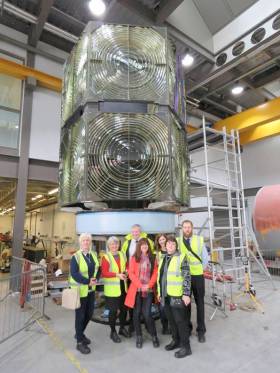Displaying items by tag: Mew Island Optic
#MewIslandOptic - The Titanic Foundation has secured funding to restore the famous Mew Island Optic for installation at Belfast’s Titanic Quarter.
Plans have been in motion of more than a year to display the rare lighthouse lens on the city’s waterfront, as previously reported on Afloat.ie.
But now those plans will soon see the light as ‘The Great Light’ with a funding award of £332,000 from the UK’s National Lottery.
The world’s first and largest hyper-radial Fresnel lighthouse lens was first installed in Tory Island Lighthouse in 1887 then reconfigured and moved to Mew Island in 1928.
The optic was removed from Mew Island Lighthouse in 2014 as the lighthouse was modernised and converted to solar power.
At around 130 years old, weighing 10 tonnes and standing seven meters tall, the Mew Island Optic is a unique heritage object of national and international importance with links to Northern Ireland’s maritime and industrial past.
Its massive beam could once be seen by mariners over 30 miles away as it guided them to and from the busy Belfast Lough.
The new project from the Titanic Foundation, in partnership with the Commissioners of Irish Lights, will see the optic given a new role as an iconic attraction which brings to life the story of lighthouses, their technological developments, their light-keepers and their role in the maritime and industrial history of Belfast and beyond.
The rotating optic will be displayed in a landmark curved glass structure in its new location on the Titanic Walkway, which is currently being developed by Titanic Quarter Limited and funded by Tourism Northern Ireland.
The 500 metres of maritime walkway will connect the Titanic and Olympic Slipways and the Alexandra Dock, linking Titanic Belfast, HMS Caroline and the Thompson Dock.
Alongside Heritage Lottery funding, the Titanic Foundation has secured £85,000 from Belfast City Council’s Local Investment Fund and £30,000 Ulster Garden Villages towards the project.
Yvonne Shields, chief executive of the Commissioners of Irish Lights, said she and her colleagues are “delighted to see our Mew Island Lighthouse Optic become part of Belfast’s world-famous Titanic Quarter.
“As ‘The Great Light’, the optic will tell the story of safety at sea, and educate generations to come on the science, engineering, and human effort that goes towards delivering this goal. In addition this will be a fabulous addition to our Great Lighthouses of Ireland tourism initiative that enables visitors to visit and stay in selected lighthouses around Ireland north and south.
“It is fitting that this unique optic comes to rest at the end of an interesting journey in Belfast, the proud maritime and industrial city it has announced to seafarers for so long. We wish the Great Light and the Titanic Foundation every success with this exciting new attraction.”
In July 2016, Belfast architects Hall McKnight were named the winners of a competition to design a structure to house the lighthouse optic.
With the recent appointment of contractors Hugh J O’Boyle Ltd, it is hoped that the optic will be in position later this year.
Green Light For Historic Lighthouse Optic On Belfast Waterfront
#MewIslandOptic - Plans to install a rare lens from one of Ireland’s tallest lighthouses on Belfast’s waterfront have been given the green light.
As previously reported on Afloat.ie, plans were announced last summer to house the optic from Mew Island Lighthouse in Belfast Lough in a much more accessible structure designed by architects Hall McKnight.
Now the News Letter reports that planning permission has been granted to install the 130-year-old, seven-metre-tall optic in the Titanic Quarter as the centrepiece of the new Titanic Walkway in the coming months.
“We are now one step closer to helping save and restore one of the largest optics of its kind ever constructed, an artefact of national and international significance,” said Titanic Foundation chief executive Kerrie Sweeney.
“This will certainly create a legacy Belfast landmark which will inspire our future generations.”
The News Letter has more on the story HERE.

























































